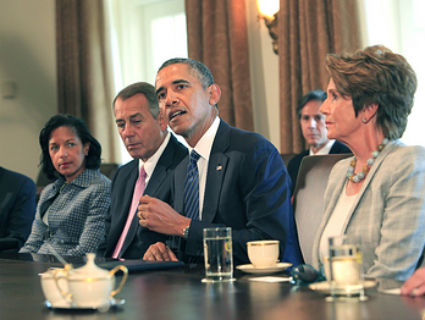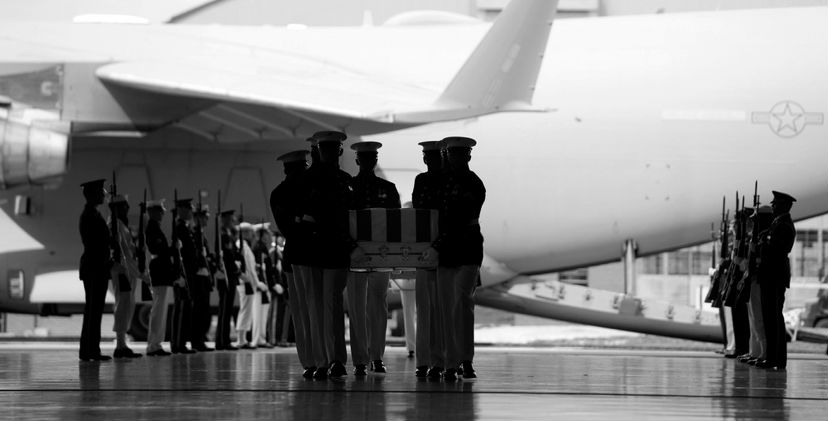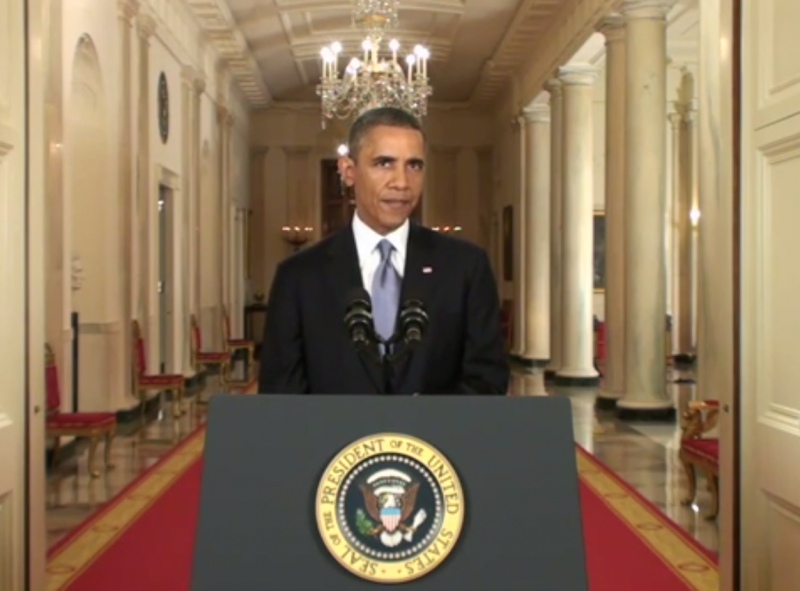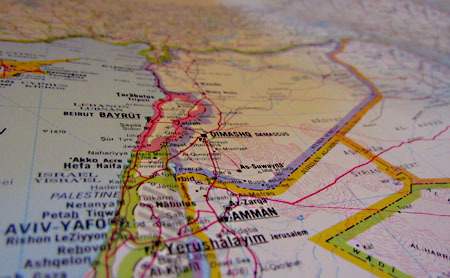
Ahmed Asad/ZUMA
This story first appeared on the TomDispatch website.
Once again, we find ourselves at the day after 9/11, and this time America stands alone. Alone not only in our abandonment even by our closest ally, Great Britain, but in facing a crossroads no less significant than the one we woke up to on September 12, 2001. The past 12 years have not been good ones. Our leaders consistently let the missiles and bombs fly, resorting to military force and legal abominations in what passed for a foreign policy, and then acted surprised as they looked up at the sky from an ever-deeper hole.
![]() At every significant moment in those years, our presidents opted for more, not less, violence, and our Congress agreed—or simply sat on its hands—as ever more moral isolation took the place of ever less diplomacy. Now, those same questions loom over Syria. Facing a likely defeat in Congress, Obama appears to be grasping—without any sense of irony—at the straw Russian President Vladimir Putin (backed by China and Iran) has held out in the wake of Secretary of State John Kerry’s off-the-cuff proposal that put the White House into a corner. After claiming days ago that the U.N. was not an option, the White House now seems to be throwing its problem to that body to resolve. Gone, literally in the course of an afternoon, were the administration demands for immediate action, the shots across the Syrian bow, and all that. Congress, especially on the Democratic side of the aisle, seems to be breathing a collective sigh of relief that it may not be forced to take a stand. The Senate has put off voting; perhaps a vote in the House will be delayed indefinitely, or maybe this will all blow over somehow and Congress can return to its usual partisan differences over health care and debt ceilings.
At every significant moment in those years, our presidents opted for more, not less, violence, and our Congress agreed—or simply sat on its hands—as ever more moral isolation took the place of ever less diplomacy. Now, those same questions loom over Syria. Facing a likely defeat in Congress, Obama appears to be grasping—without any sense of irony—at the straw Russian President Vladimir Putin (backed by China and Iran) has held out in the wake of Secretary of State John Kerry’s off-the-cuff proposal that put the White House into a corner. After claiming days ago that the U.N. was not an option, the White House now seems to be throwing its problem to that body to resolve. Gone, literally in the course of an afternoon, were the administration demands for immediate action, the shots across the Syrian bow, and all that. Congress, especially on the Democratic side of the aisle, seems to be breathing a collective sigh of relief that it may not be forced to take a stand. The Senate has put off voting; perhaps a vote in the House will be delayed indefinitely, or maybe this will all blow over somehow and Congress can return to its usual partisan differences over health care and debt ceilings.
And yet a non-vote by Congress would be as wrong as the yes vote that seems no longer in the cards. What happens, in fact, if Congress doesn’t say no?
A History Lesson
The “Global War on Terror” was upon us in an instant. Acting out of a sense that 9/11 threw open the doors to every neocon fantasy of a future Middle Eastern and global Pax Americana, the White House quickly sought an arena to lash out in. Congress, acting out of fear and anger, gave the executive what was essentially a blank check to do anything it cared to do. Though the perpetrators of 9/11 were mostly Saudis, as was Osama bin Laden, al-Qaeda itself sought refuge in largely Taliban-controlled Afghanistan. So be it. The first shots of the War on Terror were fired there.
George W. Bush’s top officials, sure that this was their moment of opportunity, quickly slid destroying al-Qaeda as an organization into a secondary slot, invaded Afghanistan, and turned the campaign into a crusade to replace the Taliban and control the Greater Middle East. Largely through passivity, Congress said yes as, even in its earliest stages, the imperial nature of America’s global strategy revealed itself plain as day. The escape of Osama bin-Laden and much of al-Qaeda into Pakistan became little more than an afterthought as Washington set up what was essentially a puppet government in post-Taliban Afghanistan, occupied the country, and began to build permanent military bases there as staging grounds for more of the same.
Some two years later, a series of administration fantasies and lies that, in retrospect, seem at best tragicomic ushered the United States into an invasion and occupation of Iraq. Its autocratic leader and our former staunch ally in the region, Saddam Hussein, ruled a country that would have been geopolitically meaningless had it not sat on what Deputy Secretary of Defense Paul Wolfowitz called “a sea of oil”—and next to that future target of neocon dreams of conquest, Iran. Once again, Congress set off on a frenzied rush to yes, and a second war commenced out of the ashes of 9/11.
With the mighty American military now on their eastern and western borders and evidently not planning on leaving any time soon, Iranian officials desperately sought out American diplomats looking for some kind of rapprochement. They offered to assist in Afghanistan and, it was believed, to ensure that any American pilots shot down by accident over Iranian territory would be repatriated quickly. Channels to do so were reportedly established by the State Department and it was rumored that broader talks had begun. However, expecting a triumph in Iraq and feeling that the Iranians wouldn’t stand a chance against the “greatest force for liberation the world has ever known” (aka the US military), a deeply overconfident White House snubbed them, dismissing them as part of the “Axis of Evil.” Congress, well briefed on the administration’s futuristic fantasies of domination, sat by quietly, offering another passive yes.
Congress also turned a blind eye to the setting up of a global network of “black sites” for the incarceration, abuse, and torture of “terror suspects,” listened to torture briefings, read about CIA rendition (i.e., kidnapping) operations, continued to fund Guantanamo, and did not challenge the devolving wars in Iraq or Afghanistan. Its members sat quietly by while a new weapon, armed drones, at the personal command of the president alone, crisscrossed the world assassinating people, including American citizens, within previously sovereign national boundaries. As a new president came into office and expanded the war in Afghanistan, ramped up the drone attacks, made war against Libya, did nothing to aid the Arab Spring, and allowed Guantanamo to fester, Congress said yes. Or, at least, not no, never no.
The World Today
Twelve years later, the dreams of global domination are in ruins and the world America changed for the worse is a very rough place. This country has remarkably few friends and only a handful of largely silent semi-allies. Even the once gung-ho president of France has been backing off his pledges of military cooperation in Syria in the face of growing popular opposition and is now calling for U.N. action. No longer does anyone cite the United States as a moral beacon in the world. If you want a measure of this, consider that Vladimir Putin seemed to win the Syria debate at the recent G20 summit as easily as he now has captured the moral high ground on Syria by calling for peace and a deal on Assad’s chemical weapons.
The most likely American a majority of global citizens will encounter is a soldier. Large swaths of the planet are now off-limits to American tourists and businesspeople, far too dangerous for all but the most foolhardy to venture into. The State Department even warns tourists to Western Europe that they might fall victim to al-Qaeda. In the coming years, few Americans will see the pyramids or the ruins of ancient Babylon in person, nor will they sunbathe, among other places, on the pristine beaches of the southern Philippines. Forget about large portions of Africa or most of the rest of the Middle East. Americans now fall victim to pirates on the high seas, as if it were the nineteenth century all over again.
 After 12 disastrous years in the Greater Middle East, during which the missiles flew, the bombs dropped, doors were repeatedly kicked in, and IEDs went off, our lives, even at home, have changed. Terrorism, real and imagined, has turned our airports into giant human traffic jams and sites of humiliation, with lines that resemble a Stasi version of Disney World. Our freedoms, not to speak of the Fourth Amendment right to privacy, have been systematically stripped away in the name of American “safety,” “security,” and fear. Congress said yes to all of that, too, even naming the crucial initial piece of legislation that began the process the PATRIOT Act without the slightest sense of irony.
After 12 disastrous years in the Greater Middle East, during which the missiles flew, the bombs dropped, doors were repeatedly kicked in, and IEDs went off, our lives, even at home, have changed. Terrorism, real and imagined, has turned our airports into giant human traffic jams and sites of humiliation, with lines that resemble a Stasi version of Disney World. Our freedoms, not to speak of the Fourth Amendment right to privacy, have been systematically stripped away in the name of American “safety,” “security,” and fear. Congress said yes to all of that, too, even naming the crucial initial piece of legislation that began the process the PATRIOT Act without the slightest sense of irony.
When I spoke with Special Forces personnel in Iraq, I was told that nearly every “bad guy” they killed or captured carried images of American torture and abuse from Abu Ghraib on his cellphone—as inspiration. As the victims of America’s violence grew, so did the armies of kin, those inheritors of “collateral damage,” seeking revenge. The acts of the past 12 years have even, in a few cases, inspired American citizens to commit acts of homegrown terrorism.
Until this week, Washington had abandoned the far-from-perfect-but-better-than-the-alternatives United Nations. Missiles and bombs have sufficed for our “credibility,” or so Washington continues to believe. While pursuing the most aggressive stance abroad in its history, intervening everywhere from Libya and Yemen to the Philippines, seeking out monsters to destroy and, when not enough could be found, creating them, the United States has become ever more isolated globally.
Our Choice
The horror show of the last 12 years wasn’t happenstance. Each instance of war was a choice by Washington, not thrust upon us by a series of Pearl Harbors. Our Congress always said yes (or least avoided ever saying no). Many who should have known better went on to join the yes men. In regard to Iran and George W. Bush, then-candidate for president Senator Joe Biden, for instance, said in 2007, “I was Chairman of the Judiciary Committee for 17 years. I teach separation of powers in constitutional law. This is something I know. So I brought a group of constitutional scholars together to write a piece that I’m going to deliver to the whole United States Senate pointing out that the president has no constitutional authority to take this country to war against a country of 70 million people unless we’re attacked or unless there is proof that we are about to be attacked. And if he does, I would move to impeach him. The House obviously has to do that, but I would lead an effort to impeach him.”
Only a year ago, Biden criticized Republican presidential candidate Mitt Romney for being too anxious to go to war with Syria. That country, Biden said, “is five times as large geographically [as Libya], it has one-fifth the population… It’s in a part of the world where they’re not going to see whatever would come from that war. It’ll seep into a regional war… If in fact it blows up and the wrong people gain control, it’s going to have impact on the entire region causing potentially regional wars.”
Biden has been missing from the public eye this week. His last public statement on Syria was in late August. Monday, while Susan Rice begged for war and Obama taped multiple TV interviews, the vice president was in Baltimore handing out federal grant money to improve the port. Silence in the face of a car wreck isn’t golden, it’s deadly. Good God, man, hit the brakes before we kill someone!
What If Congress Says Yes?
Some in Congress now are talking about a new resolution that would pre-authorize the administration to launch “fallback airstrikes“—that is, its desired attack on Syria—after some sort of deadline passed for U.N. action, Syrian action, or perhaps just another mythical red line was crossed. Should Congress say yes yet again to such a scheme or anything like it, nothing will change for the better, and much is likely to change for the worse.
An attack on Syria will demand a response; war works that way, no matter how “surgical” the strikes may be. Other countries, and even terrorists, also tend to imagine that, in such situations, their “credibility” is at stake. Fearing reprisals, the US has already preemptively withdrawn its diplomats from a consulate in Turkey near the Syrian border, and from Lebanon. Security has increased in Iraq, with the already fortress-like US embassy there bracing for attacks, allegedly already being planned by Iranian-sponsored sappers.
Be assured of one thing: bombs and missiles falling in Syria will cause “collateral damage,” newspeak for images splashed across the globe of Muslim women and children killed by American weaponry. History has ensured that borders in the Middle East are arbitrary and easily enough ignored. As the US invasion and occupation of Iraq sparked a metastasizing regional Sunni-Shia civil war, so a new intervention in the latest version of that war will lead to further, possibly devastating, and certainly divisive consequences in Lebanon, Iraq, and elsewhere. Think of this as a grim domino theory for the new century.
Should a desperate Assad regime in Syria, or an Iranian proxy from Lebanon, retaliate against Israel, the US could wake up to find itself in the middle of a far larger war. Who knows then what a Russia already moving naval forces into the Mediterranean and with a naval base in Syria itself might do, perhaps citing the need to maintain Putin’s “credibility”?
Even the most optimistic pundits do not believe a single set of strikes over a limited number of days will have much strategic effect. And what if, after giving up some or all of his chemical weapons, Assad just makes or buys more? The famous comment of General David Petraeus during the invasion of Iraq—”Tell me how this ends”—would need answering again. We didn’t like the answer the last time and we won’t like it this time.
Of course, something like half of the anti-Assad rebels fight for Islamic fundamentalist outfits. If, however unmeant, the US essentially becomes the air force over Syria for al-Qaeda-branded and other jihadist outfits, unleashing them to take further territory, that would undoubtedly create even more unsettled and unsettling conditions across the region. A rebel victory, aided by US strikes, would certainly give al-Qaeda the sort of sovereign sanctuary the US has been fighting to eliminate globally since the Clinton administration. No serious scenario has been offered in which the civil war in Syria would begin to abate thanks to US bombs and missiles.
With or without an attack, some things will remain constant. Israel destroyed Syria’s nascent attempts to build nuclear weapons and would do so again if needed. Iran has played a clever game in the regional proxy wars in Lebanon, Syria, and elsewhere—they won in Iraq—and will continue to do so. Since the 1970s, Syria has had stocks of chemical weapons that the Assad regime manufactured itself and has never used them against the United States or any other country, nor have they in 40 years transferred those weapons to any terrorists. There is no reason to believe that will change now, not even as a way to strike back should the US attack first (though the fate of those weapons, should Assad fall under US attacks, no one can possibly know.)
With a US president willing, for the first time in decades, to hand over some part of his decision-making powers to Congress (though he dubiously maintains that it would still be constitutional for him to launch strikes against Syria on his own), the Senate and House of Representatives have a chance to courageously re-insert themselves in war policy. Alternatively, they can once again assure themselves of a comfortable irrelevance. On one thing Obama is certainly right: the world is indeed watching the unfolding spectacle.
What If Congress Says No?
If Congress says no to an attack on Syria, the US may for the first time in 12 years have the chance to change the world for the better. Though this is not an overly dramatic statement, it’s also true, as every diplomat knows, that it’s easier to break things than fix them.
The world would at least have seen Washington step back after its citizenry told their government that enough is enough. The world would see an America which, in a modest but significant way, was beginning to genuinely absorb the real lessons to be drawn from our post-9/11 actions: that endless war only fuels more war, that living in a world where foreigners are seen mainly as targets brings no peace, that lashing out everywhere means no safety anywhere.
In the wake of a non-attack on Syria, parts of the world might be more open to the possibility that the United States could help open new paths, beginning with a tacit acknowledgement that we were wrong. Nothing can erase the deeds of the past years or those long memories common not just in the Middle East, but to humanity more generally. Certainly, what we did is likely to haunt us for generations. But when in a deep hole, the first step is to stop digging. Via Congress, the US can take a small first step toward becoming an “indispensable nation” in more than our own minds.
If Congress says no on Syria, it will, just as the president warns, also be sending a message to Iran—not, however, that the United States lacks the resolve to fight. It seems unlikely, given the past 12 years, that anyone doubts this country’s willingness to use force. A clear no from Congress would, in fact, send a message of hope to Iran.
It was only in June that Obama claimed Iran’s election of a moderate as president showed that Iranians want to move in a different direction. “As long as there’s an understanding about the basis of the conversation, then I think there’s no reason why we shouldn’t proceed,” Obama said. “The Iranian people rebuffed the hardliners and the clerics in the election who were counseling no compromise on anything anytime anywhere. Clearly you have a hunger within Iran to engage with the international community in a more positive way.”
Diplomacy is often a series of little gateway-like tests that, when passed, lead two parties forward. A no on Syria would be such a step, allowing Iran and the United States a possible path toward negotiations that could someday change the face of the Middle East. Only three months ago, Obama himself endorsed such a plan. If Congress says no, it won’t destroy credibility with the Iranians; it’s likely, in fact, to enhance it. This decision by Congress could empower both parties to proceed to the negotiating table in a more hopeful way. A yes from Congress, on the other hand, could sideline Iranian moderates and slam the door shut on discussions for a long time.
It is clear that partisan politics will play a significant role in Congress’s decision. That body is fundamentally a political animal, and the House, of course, faces midterm elections in little more than a year. Still, that’s not a terrible thing. After all, for the first time in a long while, when it comes to foreign policy, House members are openly speaking about the influence that a wave of constituent opposition to a Syrian intervention is having on them. They appear to be hearing us speak, even if the impulse isn’t just to do the right thing, but to garner votes in 2014.
Should Congress say no, it seems unlikely that a president, isolated at home and abroad, will go to war. Some of Obama’s top aides have already been signaling that reality. Despite macho talk in the upper echelons of his administration on his right to ignore Congress, as a constitutional scholar and a savvy politician he would be unlikely to risk the demands for his impeachment and the spectacle of a Constitutional crisis by launching Syrian strikes in the wake of a no vote. All the noise about not backing down and his credibility suffering a catastrophic blow should be taken as so much pre-vote political saber rattling. The president may make foolish decisions, but he certainly is no fool.
By saying no, not again, not this time, the current group of gray men and women who largely make up our Congress have the chance to join some of the giants who have thundered in those chambers in the past. At this moment, that body has the opportunity to choose a new meaning for future anniversaries of 9/11. It could be the day that life went on just as disastrously as previously—or it could be the day that changed everything, and this time for the better.
Peter Van Buren blew the whistle on State Department waste and mismanagement during Iraqi reconstruction in his first book, We Meant Well: How I Helped Lose the Battle for the Hearts and Minds of the Iraqi People. A TomDispatch regular, he writes about current events at his blog, We Meant Well. Van Buren’s next book, Ghosts of Tom Joad: A Story of the #99Percent, will be available March 2014.
Follow TomDispatch on Twitter and join us on Facebook or Tumblr. Check out the newest Dispatch book, Nick Turse’s The Changing Face of Empire: Special Ops, Drones, Proxy Fighters, Secret Bases, and Cyberwarfare. To stay on top of important articles like these, sign up to receive the latest updates from TomDispatch.com here.














